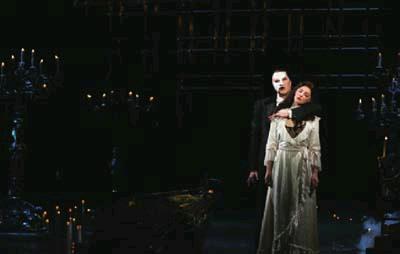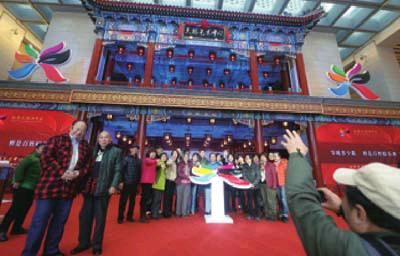Phantom Haunts Beijing
2016-03-22ByTangYuankai
By+Tang+Yuankai
The Phantom of the Opera—a musical on stage in the Chinese capital city for the first time since it debuted in 1986—wrapped up the last show of its Beijing tour on January 10.
The musical, also staged in Guangzhou in south Chinas Guangdong Province, took in a total box office revenue of over 100 million yuan ($15.2 million), pushing Beijings musical revenue to 120 million yuan ($18.2 million) in 2015, an almost 230-percent year-on-year increase.
The musical first opened at Londons West End in 1986 and on Broadway in 1988. It won the 1986 Oliver Award and the 1988 Tony Award for Best Musical. It is the longest-running show in Broadway history.
The Phantom of the Opera is based on a 1910 French horror novel by Gaston Leroux and follows a deformed composer who haunts the Paris Opera House. He lives in an underground cavern and tutors and composes operas for a young soprano star-in-the-making, Christine. But when Christine reaches success and a handsome suitor from her past reappears, the reclusive Phantom goes mad and terrorizes the opera company.
A fitting venue
The musical first came to China in 2004 when nearly 100 performances were given at the Shanghai Grand Theater. It returned to Shanghai in 2013 and was staged 64 times. Despite being the capital city and Chinas cultural center, Beijing lacked suitable theaters to host the musical.
Tian Yuan, General Manager of the Beijingbased One World Culture Communication, said she approached the musicals copyright owner about importing the musical in 1999. But no Beijing theaters at the time met the technical standards required for the musicals stage setting.
“Although there were multiple large and medium-sized theaters in Beijing, they were primarily designed for concerts rather than musicals,” Tian said.
When construction on the Tianqiao Performing Arts Center started in 2012, Tians company reached an agreement with one of the centers investors to make the main theater a professional venue for world-famous musicals.
“The main theater not only has special designs for stage setting, light and sound, but also is equipped with advanced facilities. It can satisfy the technical demand for showcasing musicals such as The Phantom of the Opera,” Tian said.
The musical was performed 64 times at the Tianqiao Performing Arts Center from November 17 of last year through January 10.

Worth the effort
The production team created startling visual and auditory effects for the Beijing audience. For example, during one climactic scene in which a huge crystal chandelier falls from the ceiling, sailing past the audiences seats and onto the stage, the speed of the chandeliers fall was increased to 2.1 meters per second, while the speed during the 2013 Shanghai tour was 1.8 meters per second.
The cast and crew made strenuous efforts to prepare for and rehearse the musical before the grand opening. It took nearly 20 days of preparation before the premiere was ready, said Richard Martin, the technical director. Ten days were needed to install the lights and other props, another three days for technical adjust- ments and the local staff to get familiar with the controls and six days for actors and actresses to rehearse. A technical rehearsal was held three hours before each show to make sure all stage lighting and stunts were ready to go.
The crew had to transport all the props and costumes to Beijing in 26 containers, which included 236 props and more than 230 costumes that weighed 200 tons. Most of the costumes and props have been handed down from its first shows with few being replaced, and a royal blue Qing Dynasty (1644-1911) officials robe embroidered with dragons, which began to be used two years ago, resonated with the Chinese audience.
“The charm of The Phantom of the Opera lies in its impeccable details, which combine to form this immortal piece of art,” said Wang Xianghua, a viewer.
Brad Little, an American actor who joined the cast in 1996 as the title role Phantom, performed in China for the fourth time. He has seen his popularity rise among Chinese audiences, who dubbed him “little bread.”
He was even invited to sing The Music of the Night, a song from the musical, at China Central Televisions New Year gala broadcast on December 31, 2015. Little started a personal blog in China and asked his friend to post information about the musical and himself during his stay in China.
Christine, the female protagonist, was played by young actress Emilie Lynn.
Despite the original musicals popularity, Chinese audiences highly anticipate a localized version. A Chinese version hasnt been produced due to copyright issues, according to Kerry Comerford, Vice President of the Really Useful Co. Asia Pacific, a subsidiary of the corporation that owns the copyright. But given the success of the Chinese versions of Cats and Mamma Mia! in recent years, a Chinese version of The Phantom of the Opera is within reach, Comerford said.
Zhang Yu, Chairman of the China Arts and Entertainment Group, the parent company of One World Culture Communication, said musicals are unique in that they have a complete and mature business model under which a musical can be easily reproduced. Not all types of performance art are able to do so.
“At present, world-famous musicals should be imported in order to attract the audiences attention to musicals and draw them into theaters. This is a necessary step toward developing the domestic market for musicals,” Tian said.
